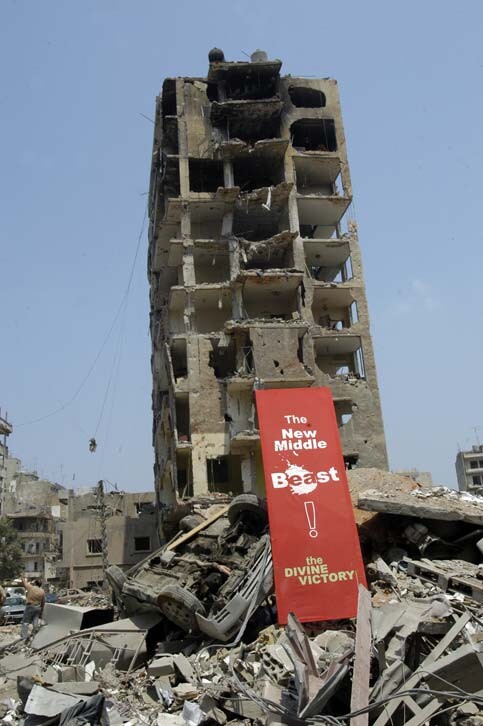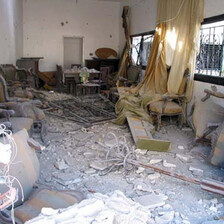United Nations Children's Fund 19 August 2006

A sign proclaiming “The New Middle Beast” hangs on a building destroyed by Israeli airstrikes in Al-Dahieh, south of Beirut, August 19, 2006. (MaanImages/Payam Borazjani)
The first consignment of UN aid arrived yesterday in the shattered town of Bint Jbeil, close to the Lebanese border with Israel and scene of some of the fiercest fighting during the recent conflict. UNICEF Communication Officer Simon Ingram travelled with the convoy and filed this report.
BIN JBEIL, Lebanon, 18 August 2006 – It’s 8 a.m. and our convoy of 16 battered trucks is lined up on the Tyre seafront. I am in the rear escort vehicle, an armoured Land Cruiser, in line with the tight security rules that apply to a zone of recent conflict.
We set off on the road heading east, joining a line of Lebanese army troop carriers and armoured personnel carriers deploying to the same area.
Fatigue and tension
At first, a series of huge bomb craters and several devastated petrol stations are about the only visible evidence that we are travelling through a war zone. The lemon and pomegranate orchards lining the road seem tranquil enough.
Climbing towards our first stop, Jwayya, the trucks slow to a crawl, allowing cars crammed with displaced families to roar past. The return exodus from the north is now well under way, but – as we soon discover – many of these people will have little to return home to.
Our stop in Jwayya is brief – long enough to hand over two truckloads of flour, cooking oil and lentils to the local municipality, and to have a short conversation with a woman standing in front of one of the few shops that are open for business. The town might have been largely spared by the fighting, she says, but the inhabitants who stayed have been without running water, power and gas for weeks. The fatigue and tension on her face tell their own story.
Detritus of war
By the time we reach Al Majadil, the physical evidence of war is more apparent. We pass buildings that have lost whole floors or whose façades have been ripped off, exposing the rooms behind. The metal shutters on the shops nearby have been sucked outwards by the force of each explosion. Broken glass and other debris line the road.
But it’s at our next stop, Tibnin, that we start to see the true impact of the disaster that has befallen these communities. Some buildings look as if they’ve been flattened by an earthquake. In front of the little hospital, there’s a row of charred cars.
A bomb disposal expert from the Mines Advisory Group is peering at a small object on the tarmac – a cluster bomb, he tells me, one of about 200 that have been found around the hospital.
Not many people have returned to Tibnin yet, but more are coming each day. Eight of our trucks head off to a depot where the municipality wants the food left ready for distribution. Two thousand litres of fuel are left at the hospital – enough to ensure that the operating room and other facilities keep functioning, at least for now.
Supplies to a scene of devastation
A brief delay while one of our remaining trucks has a blocked fuel filter fixed, and then we’re off to our final destination, Bint Jbeil. From the charred Mercedes at the town entrance onwards, the town is a picture of devastation. The main street looks like a set from Stalingrad. One school has taken a direct aerial strike, and one wall is missing. The desks are clearly visible inside. Another school looks to have been the scene of a pitched battle.
I meet Samia, a woman in her thirties who fled Bint Jbeil at the height of the fighting. She’s still recovering from the shock of discovering that her toy shop has been completely destroyed. Her home is intact, she says, but every room has been holed by shell or rocket fire. A heavy table that she and her four-year-old daughter sheltered under during the battle has a large hole in it.
“I can’t believe it,” she says repeatedly, gazing at the devastation around her.
Samia’s daughter and the rest of her family are still in Beirut. They’ll stay there for a while, she tells me. “But we’ll be back soon, and start again,” says Samia.
We drop the final load of flour and lentils in a garage near the (now ruined) municipality store. It’s clear that for the small number of people now back in town, water and bread would have been more useful. The convoy supervisor from the World Food Programme takes due note. UNICEF has been supplying bottled water to south Lebanon since the start of the conflict; I pass word back to our new office in Tyre, and the following day two truckloads are delivered to Bint Jubeil.
Related Links

